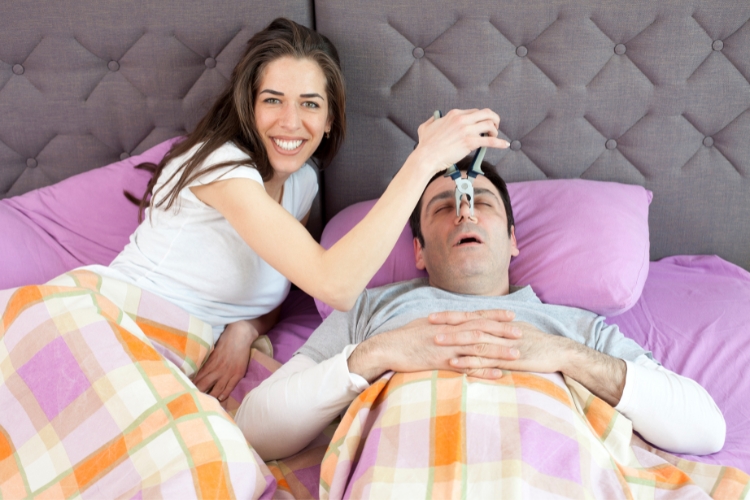Snoring is more than just a nuisance for those trying to get a good night’s sleep; it’s a common problem that affects millions worldwide and can have significant health implications. From lifestyle changes to medical interventions, there are various strategies to mitigate or even resolve snoring.
In this blog post, we will explore practical steps to address snoring, aiming to restore peaceful nights and promote overall health.
Key Takeaways
- Effective weight management and regular exercise can improve throat muscle tone and reduce snoring.
- Adjusting sleep positions can prevent airway blockages and lessen snoring intensity.
- Continuous Positive Airway Pressure (CPAP) therapy and oral appliances are proven medical solutions for those with sleep apnea-related snoring.
- Surgical interventions may offer a permanent solution to snoring but are generally considered after other treatments have failed.
- Consulting with a sleep specialist and undergoing sleep studies are essential steps when snoring indicates possible Obstructive Sleep Apnea.
Understanding Snoring and Its Impact
The Basics of Snoring
Snoring is not just a minor annoyance but a condition that can have significant implications for health and well-being. It is a rough, hoarse noise produced upon the intake of breath during sleep, caused by the vibration of the soft palate and vocal cords. This common issue affects people globally and can be indicative of deeper health problems or lifestyle habits.
Snoring is a widespread problem that frequently can be effectively addressed or entirely solved with the appropriate strategy.
While some may view snoring as a benign inconvenience, it can actually lead to disrupted sleep for both the snorer and their partner, potentially resulting in daytime fatigue and strained relationships. Addressing snoring is not only about improving sleep quality but also about enhancing overall health.
Here are some steps to begin addressing snoring:
- Acknowledge the issue and its impact on your life
- Understand the potential causes, such as weight, alcohol consumption, and sleeping position
- Explore both lifestyle changes and medical interventions
- Consider the effectiveness of various treatments and remedies
Health Implications of Chronic Snoring
Chronic snoring is not just a nuisance but can be a sign of underlying health issues. Obstructive Sleep Apnea (OSA) is one such condition that is often associated with persistent snoring and can lead to serious health complications if left untreated. OSA is characterized by repeated episodes of partial or complete obstruction of the airway during sleep, resulting in reduced oxygen flow to the body and brain.
Chronic snoring and OSA can significantly impact one’s health, leading to a range of issues from daytime fatigue to more severe conditions like heart problems.
The health risks associated with chronic snoring are diverse and can affect various aspects of well-being:
- Excessive daytime sleepiness
- Irritability and mood changes
- Memory problems and confusion
- Increased risk of accidents
- Night sweats
- Morning headaches
- Elevated blood pressure
- Weight gain and obesity
Addressing snoring is crucial not only for the quality of sleep but also for overall health. It is important to recognize the signs and seek appropriate treatment to mitigate these risks.
The Effect on Relationships and Sleep Quality
Snoring is not just a nuisance; it can be a significant disruptor of both personal relationships and sleep quality. The strain it places on bed partners can lead to frustration and sleepless nights. According to the Sleep Foundation, 75% of respondents who share a bed with a snorer report that snoring affects their sleep, and a similar number state it impacts their well-being.
Creating an optimal sleeping environment is crucial for both the snorer and the partner. This includes using air purifiers to remove allergens, maintaining cleanliness, and using humidifiers to prevent air dryness. Such measures can contribute to a more restful sleep for everyone involved.
It’s important to recognize that snoring can be a shared problem, and addressing it can improve the quality of life for both partners.
Lifestyle adjustments, like reducing alcohol consumption before bed and ensuring proper hydration, can also play a role in mitigating snoring. These changes not only benefit the snorer but also the partner, leading to a more harmonious and restful night’s sleep.
Lifestyle Changes to Combat Snoring
Weight Management and Neck Circumference
Excess weight, particularly around the neck, can significantly increase the likelihood of snoring by tightening the throat and making it more prone to closure during sleep. Managing your weight can be a powerful step in reducing snoring.
Maintaining a healthy weight range not only improves overall health but also minimizes the pressure on the throat muscles, enhancing airflow during sleep.
Lifestyle modifications, such as a balanced diet and regular exercise, are essential for weight management. Here’s a simple guide to get started:
- Assess your diet: Focus on whole foods and reduce intake of processed items.
- Stay hydrated: Drink plenty of water throughout the day.
- Regular physical activity: Aim for at least 30 minutes of moderate exercise most days.
- Monitor progress: Keep track of your weight and neck circumference to gauge improvements.
By addressing these factors, you can create a positive impact on your snoring and overall sleep quality.
The Role of Exercise in Reducing Snoring
Engaging in regular physical activity is a proactive step towards mitigating snoring. Exercise enhances muscle tone throughout the body, including the throat muscles, which can help keep airways open during sleep. Additionally, exercise aids in weight management, a critical factor in reducing snoring, as excess weight can constrict the throat’s air passage.
Exercise not only contributes to overall health but also specifically targets the factors that exacerbate snoring. By incorporating a routine that includes aerobic and resistance training, individuals can work towards a quieter night’s sleep.
While the benefits of exercise are clear, it’s important to adopt a consistent routine:
- Start with moderate aerobic activities like walking, cycling, or swimming.
- Gradually increase intensity and duration as fitness improves.
- Incorporate strength training exercises to build muscle tone.
- Aim for at least 150 minutes of moderate exercise per week.
Consistency in exercise can lead to significant improvements in snoring severity and frequency, enhancing both sleep quality and overall health.
Adjusting Sleeping Positions for Better Airflow
Altering your sleeping position can have a significant impact on snoring. Sleeping on your back often worsens snoring because it allows the tongue to fall backward into the throat, narrowing the airway and obstructing airflow. To promote better breathing and reduce snoring, consider the following adjustments:
- Elevate the head of the bed: Raising the head by about four inches can help keep the airways open.
- Side sleeping: Lying on your side is one of the most effective ways to reduce snoring. It prevents the tongue from falling back and helps maintain an open airway.
- Use of body or wedge pillows: Special pillows can help maintain a side-sleeping position throughout the night.
Positional therapy, which involves wearing a device to prevent back sleeping, and throat exercises can also aid in reducing snoring. Creating an optimal sleeping environment by using air purifiers and humidifiers can further alleviate snoring.
Remember, while adjusting sleeping positions can provide immediate relief for some, it may not be a comprehensive solution for everyone. Consistent practice and combining this approach with other interventions can lead to the best results.
Medical and Therapeutic Solutions
Continuous Positive Airway Pressure (CPAP) Therapy
Continuous Positive Airway Pressure, or CPAP therapy, is a widely recognized treatment for individuals suffering from obstructive sleep apnea, which is often linked with chronic snoring. CPAP machines work by delivering a steady stream of air through a mask, maintaining an open airway throughout the night. This not only helps to eliminate snoring but also improves overall sleep quality and reduces restlessness during sleep.
CPAP therapy is considered a first-line treatment for sleep apnea and is supported by extensive scientific evidence. It is often recommended as an initial remedy before considering more invasive options like surgery.
Patients using CPAP therapy may experience a significant improvement in their sleep patterns. The therapy requires consistent use every night, and while it can take some time to get accustomed to wearing the mask, the benefits are substantial. Here are some key points to remember about CPAP therapy:
- It is a non-invasive treatment option.
- Regular use is crucial for effectiveness.
- It may take time to adjust to the sensation of wearing a mask.
- Follow-up with a sleep specialist is important to ensure the therapy is working as intended.
Oral Appliances and Dental Interventions
Oral appliances are a non-invasive treatment option for snoring, designed to maintain an open airway by repositioning the jaw or tongue. These devices can significantly reduce snoring by moving the tongue away from the back of the throat, thus minimizing airway obstruction during sleep.
Customization of these appliances is key, as they must be tailored to the individual’s mouth structure. A dental professional with experience in sleep disorders is essential for fitting, adjusting, and monitoring the appliance to ensure effectiveness and address any complications.
The following list outlines the typical process for obtaining and using an oral appliance:
- Consultation with a dental professional experienced in sleep-related breathing disorders.
- Assessment of the mouth structure and snoring severity.
- Custom fabrication of the oral appliance to fit the individual’s mouth.
- Fitting session to adjust the appliance for comfort and effectiveness.
- Regular follow-up visits to monitor the appliance’s performance and make any necessary adjustments.
Surgical Options for Persistent Snoring
When other treatments have not yielded the desired results, surgical interventions may be considered as a more definitive approach to address persistent snoring. These procedures typically involve the removal of excess tissue from the throat or the correction of anatomical abnormalities that contribute to snoring. Surgical options can offer a permanent solution but should be seen as a last resort due to the risks and recovery time associated with surgery.
Surgical treatments are varied and can include procedures such as Palatopharyngoplasty, which encompasses techniques like uvulopalatopharyngoplasty and expansion sphincter pharyngoplasty, among others. These surgeries aim to widen the airway by restructuring or removing tissues in the throat.
It’s important to have a thorough evaluation by a specialist to determine the most appropriate surgical option based on individual conditions. The following is a list of common surgical procedures for snoring:
- Uvulopalatopharyngoplasty (UPPP)
- Laser-assisted uvulopalatoplasty (LAUP)
- Radiofrequency ablation (RFA)
- Genioglossus advancement (GA)
- Hyoid suspension
Each procedure has its own indications, benefits, and potential complications. A detailed discussion with a healthcare provider is essential to weigh the risks and benefits before proceeding with surgery.
Home Remedies and Alternative Approaches
Natural Supplements and Herbal Remedies
Exploring natural supplements and herbal remedies can be a gentle yet effective approach to reducing snoring. Peppermint oil, for instance, has properties that may help clear the nasal passages and respiratory tract, potentially easing snoring and symptoms of mild sleep apnea.
Some individuals find relief by incorporating certain herbs into their nightly routine. The following list includes popular options believed to support respiratory health:
- Eucalyptus
- Lavender
- Chamomile
- Peppermint
- Lemon balm
While these remedies are generally considered safe, it’s important to use them correctly and be aware of any potential allergies. > Always consult with a healthcare provider before starting any new supplement or herbal remedy, especially if you are taking other medications.
Remember, while natural remedies can be helpful, they should not replace medical advice or treatment for underlying conditions that may be causing snoring.
Sleep Hygiene Practices
Improving your sleep hygiene is a pivotal step towards mitigating snoring and enhancing overall sleep quality. Sleep hygiene encompasses the habits, routines, and environmental factors that contribute to restful sleep.
- Establish a regular sleep schedule by going to bed and waking up at the same time every day, even on weekends. This consistency helps regulate your body’s internal clock and can lead to deeper, more restorative sleep.
- Optimize your bedroom environment by using air purifiers to remove allergens, and humidifiers to maintain air moisture, thus preventing throat dryness that can exacerbate snoring.
- Limit alcohol and sedatives before bedtime as they can increase muscle relaxation in the throat, making snoring more likely.
- Stay hydrated to ensure nasal and soft palate secretions are less sticky, reducing the likelihood of snoring.
By creating an optimal sleeping environment and adhering to good sleep practices, you can significantly reduce snoring and improve your sleep quality.
Remember, addressing snoring is not just about the noise—it’s about improving your health and well-being. Consistent efforts in practicing good sleep hygiene can have a profound impact on your life.
Anti-Snoring Devices and Their Effectiveness
The market offers a variety of anti-snoring devices that claim to alleviate or eliminate snoring. Among these, anti-snoring mouthpieces and mouthguards have gained popularity for their non-invasive approach and ease of use. These devices work by repositioning the jaw or tongue to keep the airway open during sleep, which can significantly reduce snoring episodes.
While many users report improvements in sleep quality, the effectiveness of these devices can vary based on individual anatomy and the underlying cause of snoring. It’s important to select a device that is well-reviewed and, ideally, recommended by a healthcare professional.
The right anti-snoring device can be a game-changer for those struggling with snoring, offering a night of uninterrupted sleep and improved overall health.
Here are some considerations when choosing an anti-snoring device:
- Comfort and fit: A poorly fitting device can be ineffective or even worsen snoring.
- Customization: Devices customized by dental professionals may offer better results.
- Ease of use: Simple, user-friendly designs are more likely to be used consistently.
- Durability: A quality device should withstand regular use over time.
When to Seek Professional Help
Identifying the Signs of Obstructive Sleep Apnea
Obstructive Sleep Apnea (OSA) is not just about loud snoring; it’s a condition that can have serious health consequences. Recognizing the signs of OSA is crucial for timely intervention and treatment. If you experience excessive daytime sleepiness, irritability, or have poor memory, these could be indicators of OSA. Other symptoms include:
- Morning headaches
- Night sweats
- High blood pressure
- Obesity
It is essential to be aware of these symptoms as they may point to a larger issue beyond just snoring. OSA can lead to heart problems and other health complications if left untreated.
If you or your partner notice frequent episodes of stopped breathing during sleep, gasping for air, or choking, these are significant warning signs. A combination of these symptoms, especially when paired with loud snoring, should prompt a consultation with a healthcare provider.
Consulting with a Sleep Specialist
When lifestyle adjustments and home remedies don’t alleviate snoring issues, it’s time to consult with a sleep specialist. These professionals can provide a comprehensive evaluation and tailor a treatment plan that addresses the underlying causes of your snoring.
- A sleep specialist will review your medical history.
- They will conduct a physical examination.
- They may recommend a sleep study to monitor your breathing and other body functions during sleep.
Seeking the expertise of a sleep specialist is a proactive step towards reclaiming a restful night’s sleep and improving overall health.
After the initial consultation, the specialist may suggest various interventions, ranging from CPAP therapy to surgical options, depending on the severity and nature of your snoring. It’s crucial to follow through with the recommended treatment to achieve the best possible outcome.
The Role of Sleep Studies in Diagnosing Snoring Issues
Sleep studies play a pivotal role in the accurate diagnosis of snoring issues, particularly when they may be symptomatic of a more serious condition like Obstructive Sleep Apnea (OSA). A sleep study, or polysomnography, is a comprehensive test that records the physical states during sleep to provide a clear picture of what is causing the snoring.
Sleep studies are typically conducted in a sleep lab, where you can be monitored overnight. The data collected includes brain waves, blood oxygen level, heart rate, breathing, as well as eye and leg movements.
Following the sleep study, the results will be analyzed by a sleep specialist. This analysis can reveal the severity of the snoring and whether it is linked to any sleep disorders. Based on the findings, a tailored treatment plan can be developed. It’s important to note that not all snoring is indicative of OSA, but persistent symptoms warrant professional evaluation.
If you recognize signs of OSA in yourself or a loved one, such as excessive daytime sleepiness or morning headaches, it’s crucial to consult with a healthcare provider. They may recommend a sleep study as part of the diagnostic process. Here are some common indicators that suggest a sleep study may be necessary:
- Frequent, loud snoring
- Pauses in breathing during sleep
- Choking or gasping for air at night
- Unrefreshing sleep, despite sufficient hours
Addressing snoring through professional help can lead to better sleep quality and overall health, reducing the risk of complications associated with untreated sleep disorders.
Conclusion
In conclusion, snoring is a common issue that can often be managed or even resolved with the right approach. From lifestyle adjustments to medical interventions, there are numerous strategies one can employ to combat this disruptive sleep condition.
It’s important to remember that addressing snoring not only improves the quality of sleep for the individual but also benefits the overall health and well-being of both the snorer and those around them.
By exploring the various methods discussed in this article, including weight management, positional changes during sleep, oral appliances, and even surgical options, individuals can find a suitable solution to achieve quieter, more restful nights. Ultimately, taking action against snoring is a step towards better sleep and a healthier life.
FAQs
What are the common causes of snoring?
Snoring can be caused by various factors including obesity, alcohol consumption, nasal congestion, sleep position, and anatomical variations. Chronic snoring may indicate underlying health issues like obstructive sleep apnea.
Can lifestyle changes really help reduce snoring?
Yes, lifestyle changes such as weight management, regular exercise, and altering sleep positions can significantly reduce snoring by improving airflow and strengthening the muscles in the throat.
How does CPAP therapy work to stop snoring?
CPAP therapy involves wearing a mask that delivers continuous positive airway pressure to keep the airway open during sleep, thereby preventing snoring and improving sleep quality.
Are there any effective home remedies for snoring?
Home remedies like elevating the head of the bed, using nasal strips, practicing good sleep hygiene, and trying herbal supplements may provide relief for mild snoring.
When should I consider seeing a professional for my snoring?
If snoring is loud, persistent, and accompanied by daytime fatigue or choking/gasping at night, it’s important to consult a sleep specialist to rule out obstructive sleep apnea or other disorders.
Can dental interventions help with snoring, and if so, how?
Dental interventions such as oral appliances can help by positioning the lower jaw forward during sleep, which moves the tongue away from the back of the throat and reduces airway obstruction.






